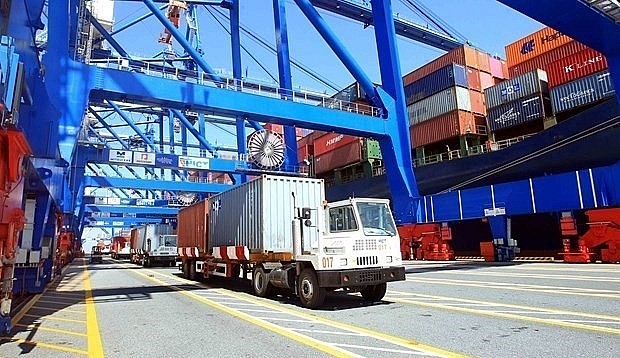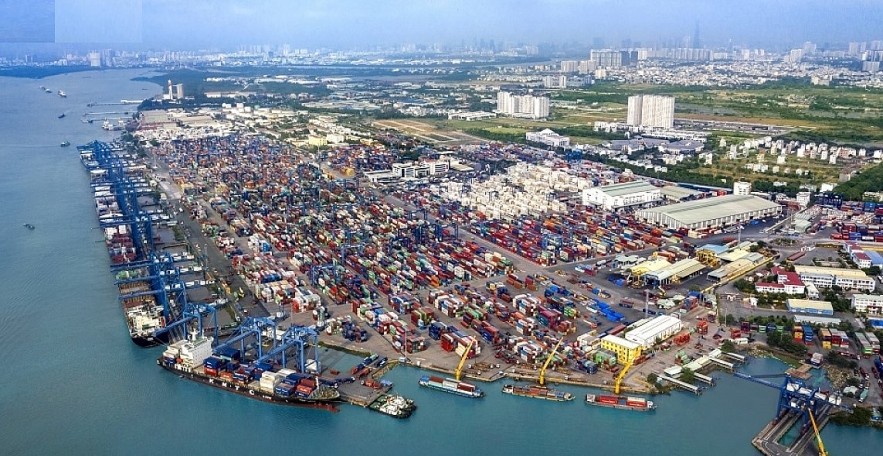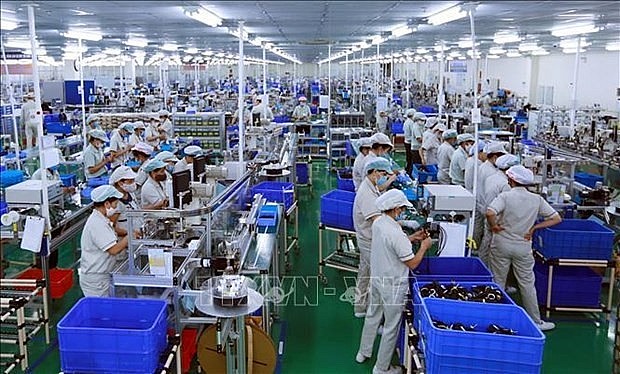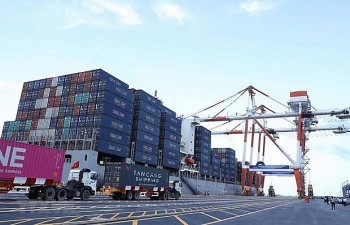IMF Forecasts Vietnam’s GDP Growth at 7.2% in 2023
 |
| At the Hai Phong port (Photo: VNA) |
In 2020 and 2021, despite impacts of the pandemic, Vietnam maintained positive growth, mainly thanks to increases in import-export and investment, especially foreign direct investment. Following better COVID-19 control, a strong recovery was recorded in a number of industries, such as retail, personal goods, pharmaceuticals, logistics, and forestry.
The Asian Development Bank (ADB) forecast that Vietnam's economic growth would recover to 6.5 percent in 2022 and reach 6.7 percent in 2023.
And, the International Monetary Fund (IMF) has predicted that with the country’s ongoing strong economic recovery, the Vietnamese economy is likely to reach real GDP growth rates of 6% this year before rising to 7.2% in 2023.
This projection was made in a press release on July 5 following the recent annual consultation between the IMF Executive Board and the Vietnamese Government.
Directors of the IMF’s Executive Board commended Vietnamese authorities for adopting policies to cushion the impact of the pandemic, successfully maintaining fiscal, external, and financial stability, and successfully deploying its impressive vaccination rollouts.
 |
They pointed out that a recovery is currently underway in Vietnam and high frequency indicators point to stronger momentum for the year ahead, with rising retail sales, industrial production, and firm entry.
Moving forward, Vietnam’s GDP growth rate is expected to reach 6% this year as activity normalisation continues and the Program for Recovery and Development (PRD) is implemented, according to the IMF.
However, the recovery of the labour market is lagging due to high underemployment. Although inflation has recently picked up due to rising commodity prices coupled with supply-chain disruptions, it remains well below the central bank’s inflation ceiling, largely due to economic slack and relatively stable food and administered prices, commented IMF experts.
In addition, they said, while a strong economic recovery is underway, it currently remains uneven, causing a lag in the labour market, rising financial sector vulnerabilities, and longstanding structural challenges. Noting some of the risks are to these challenges, they called for agile policymaking, proactively adjusted to the pace of the recovery, and evolution of risks.
IMF experts also underscored the need for fiscal policy to take the lead and be flexibly adjusted to be in line with evolving economic conditions. They welcomed the PRD and emphasised the importance of targeting, spending efficiency, and steadfast implementation. As a result, they encouraged a gradual fiscal adjustment when the recovery becomes more entrenched, with a primary focus on revenue mobilisation to create space for spending on social, climate, and other development objectives.
 |
| Illustrative photo (Source: VNA) |
The necessity for monetary policy to be nimble and vigilant in terms of inflationary risks was also stressed by directors, with a specific focus on the importance of addressing loan problems, normalising regulatory forbearance in a timely fashion, and closely monitoring risks in the real estate sector. They noted that over the medium term, bank capital positions must be strengthened and macroprudential regulations and private debt restructuring frameworks enhanced.
The directors remarked on the country’s external position being stronger than warranted by fundamentals and desirable policies. In this regard, they called for continued efforts to boost domestic private investment and enhance social safety nets, welcoming recent steps towards achieving greater exchange rate flexibility and monetary policy modernisation and encouraging continued efforts to move in this direction, according to the VOV.
The consultation saw participants conclude by underscoring the importance of structural reforms which seek to improve the local business environment, enhance productivity, and boost potential growth. They concurred that priority should be given to reducing labour skill-mismatches, promoting digital transformation, and ensuring a level playing field, particularly for SMEs.
The directors also praised the country’s ambitious environmental agenda and urged the translation of targets into concrete policy actions. They welcomed continued efforts to improve economic institutions and strengthen governance, including the Anti-Money Laundering and Combating the Financing of Terrorism (AML-CFT) framework, while outlining the importance of strengthening data frameworks.
 | Digital economy set to make up 30 percent of Vietnam’s GDP by 2030 The digital economy is expected to contribute 30 percent of the national gross domestic product (GDP) by 2030. |
 | Vietnam’s GDP increases by 4.48% in first quarter of 2021 The gross domestic product (GDP) during the initial quarter of the year is estimated to have recorded an increase of 4.48% compared to the same ... |
 | Vietnam’s GDP Grows 1.42 Percent In Nine Months Vietnam’s gross domestic product (GDP) increased by 1.42% in the first nine months of 2021, remarking a significant success of the country while battling against ... |


